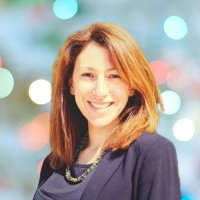
Danielle Abraham
Volcani International Partnerships
Transforming African Agriculture with Israeli Innovation
Danielle Abraham discusses how Israeli know-how is being directed to boosting agricultural output in Africa. She discusses the state of African farming infrastructure, the role of extension officers and the magnitude of minimizing post-harvest losses. The podcast addresses the importance of government stability, the involvement of China in Africa and Africa’s receptivity to Israeli knowledge transfer.
Danielle Abraham
Danielle Abraham is the Executive Director at Volcani International Partnerships. Danielle has spent her career in Israel dedicated to connecting Israeli expertise to needs in developing countries.
She has previously served as a senior policy advisor in MASHAV, Israel’s agency for International Development Cooperation at the Ministry of Foreign Affairs, and represented Israel as a guest speaker at the UN, OECD and the German Development Bank.
TOPIC:
INDUSTRY:
AFFILIATION:
SUBSCRIBE
iTunes | Spotify | Google Podcasts | Amazon Music | Tune In | Listen Notes | Pocket Casts | Pod Chaser | Deezer | Stitcher
SHOW NOTES:
00:00:59 – It has poor soil. And a lack of water and situated in a rather difficult neighbourhood …
we’re a nonprofit organization based both in Israel and in the US. And our mission is really to address issues of global food and nutrition insecurity using Israel’s agricultural experience, expertise, technologies, but primarily also Israel’s capacity to innovate.
Because if you understand anything about Israeli agriculture or what’s happened in Israel, it’s obvious to say that Israel is not a natural nor sensible place to do agriculture. You know, it’s a tiny country. It’s 2/3 desert associated with that.
It has poor soil. And a lack of water and situated in a rather difficult neighbourhood, you know, it’s export markets. We’re just that much further afield. And therefore what Israel did and a very short space of time to transform its agriculture has meant Israel has so much to offer the rest of the world as they grapple with these challenges, and even more so in climate change.
00:09:48 – I don’t think it was as good as some of us with the Zionist dream would have hoped …
Ethiopian Jewish community goes back, you know, several decades when they were airlifted out of Ethiopia to Israel. It was very important to the state and actually the efforts are still going on today to take out the last Ethiopian Jews out of Ethiopia, as far as I understand.
I do think they face some challenges integrating into Israeli society. I don’t think it was as good as some of us with the Zionist dream would have hoped or as easy for them as I would have wanted it to be, but they are here. In Israel, you know, Israelis, Jewish members of society.
And you can also see there are guest workers from Africa, if that’s the right term. And we’ve also got African asylum seekers or refugee communities, primarily from Eritrea and Sudan.
00:28:23 – And my position is that we need very strong partners on the ground …
And sadly, the increasing need on a global scale, you know, for agricultural solutions, especially when you’re looking at climate change.
The increasing semi arid, arid nature of the land and the lack of water. So what has happened is we’ve received requests from abroad and we have to assess, you know, which ones should we prioritise and which ones can we address.
Now I know and I’ll share my philosophy with you that Israel has so much to offer and so my biggest question is how can we enhance or maximize the impact that we have?
And my position is that we need very strong partners on the ground because whilst we have wonderful expertise here, you know, both in the scientists in Israel. And the agronomists and of course we’ve got all of the agritech companies behind with the solutions.
00:34:47 – And what we are planning to do is to provide those leading agricultural entrepreneurs with two years of agricultural support from Israel.
And that’s also a great example of, you know, what I call top down approach, the, you know, really going from the government top down.
I also believe that we could have a great impact by going bottom up. And we’ve designed a program based on Israel’s experience called the Israel Africa Pioneer Program. It’s about identifying leading agricultural entrepreneurs, African agriculture entrepreneurs, you know, who have a track record of success of an existing farm, for example, who are already growing.
In a more sophisticated way as a business and who are already impacting the communities around them, either by serving as off takers or by training the community.
And what we are planning to do is to provide those leading agricultural entrepreneurs with two years of agricultural support from Israel, really like Israeli farmers would have received and we’re hoping.
OTHER RESOURCES:
1) Enhanced Negotiating Strategies: This two-day seminar discusses the most intense negotiating strategies and tactics allowed without violating your ethics or morals
2) Valuation of Emerging Technologies: This seminar provides an in-depth review of more than 20 Valuation Methodologies
3) Solution Nation – The Book: Learn how the world’s most disadvantaged and destitute people stand to benefit from Israeli ingenuity.
 Solution Nation
Solution Nation